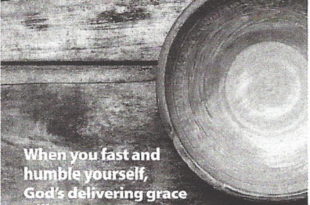
An ever increasing number of Protestants are finding the advantages and intensity of profound fasting. While the training is regular among individuals from the Roman Catholic and other religious ministry (explicitly clerics, nuns and priests) up to this point not all that numerous laypeople have fasted. In any case, that is evolving.
The Bible notices fasting much of the time. Fasting was basic in Biblical occasions and still is for some Jews and Christians. Two explicit occasions of fasting are Yom Kippur, or the Day of Atonement, for the Jews; and Lent, which is polished for 40 days before the festival of Resurrection Sunday for the Christian. Furthermore, there are some more.
In this article, I am going to fixate on Christian fasting, as that is my own understanding, while at the same time perceiving that a considerable lot of profound fasts for devotees of Jesus Christ are established in Jewish customs (recall, Jesus was a Jew).
As a matter of first importance, let me characterize fasting. The Hebrew word for “quick” signifies “spread over the mouth.” The Greek word for “quick” signifies “to swear off nourishment.” So fasting is going without sustenance for an otherworldly reason (for more data about what fasting is and isn’t, see interfaces underneath for “The Daniel Fast is ALWAYS a Spiritual Fast”).
Moreover, there are diverse sorts of fasts, including a flat out quick (no nourishment, no refreshments), a typical quick (no sustenance) and a fractional quick (keeping away from some particular nourishments and drinks or swearing off sustenance or potentially drinks amid specific hours). You can study the sorts of fasts by perusing the articles referenced toward the finish of this article, including “Kinds of Fasting”.
Maybe a standout amongst the most dominant components of Christian profound fasting is that the devotee is putting aside a particular timeframe to give additional concentration toward God. This is a period of “sanctification unto the Lord.” Consecration signifies “devoted for a holy reason.” So when a devotee chooses to quick, the objective is to concentrate on God for a particular reason.
Fasting without an object resembles setting out for an adventure without a goal. A few records of fasting are incorporated into the Bible, and all were connected to a reason. In Daniel 10, the prophet was loaded in light of a fantasy. Daniel “ate no valuable nourishments or meat and drank no wine” for 21 days. After this halfway quick, the heavenly attendant of the Lord visited Daniel and let him know of things to come.
The New Testament notes different records of fasting, including the one where church pioneers in Antioch were looking for the Lord’s direction with supplication and fasting. Acts 13:2, 3 peruses, “As they tended to the Lord and fasted, the Holy Spirit stated, ‘Presently separate to Me Barnabas and Saul for the work to which I have called them.’ Then, having fasted and asked, and laid hands on them, they sent them away.”
When we quick and implore, we are “squeezing into God.” We are expanding our concentration for a particular reason. The reason might be a specific requirement for direction, recuperating, money related achievement or the craving to move nearer to the Lord.
The control of fasting positions us. The devotee is putting he or her life elements on ready that they are putting aside a particular time to look for God and His knowledge. Fasting unto the Lord dependably guides us toward Jesus . . . to His wants for us . . . what’s more, to His ways.
The Bible says in James 4:8, “Gravitate toward to God and He will gravitate toward to you.” When we set our hearts on craving a greater amount of God in our lives, and position ourselves to look for Him with petition and fasting, He says He will meet us.
This is the power and the incredible advantage of profound fasting!
 1 Healthy Eating Your No.1 Healthy Blog
1 Healthy Eating Your No.1 Healthy Blog



